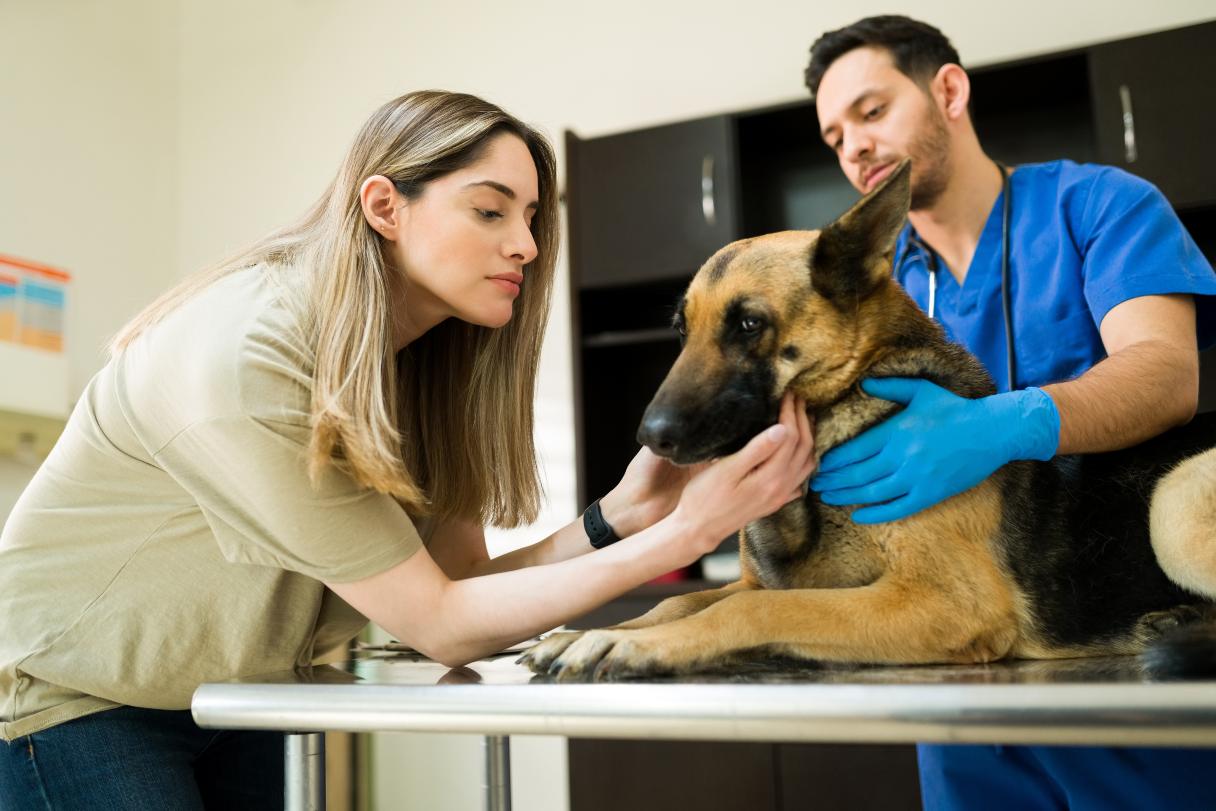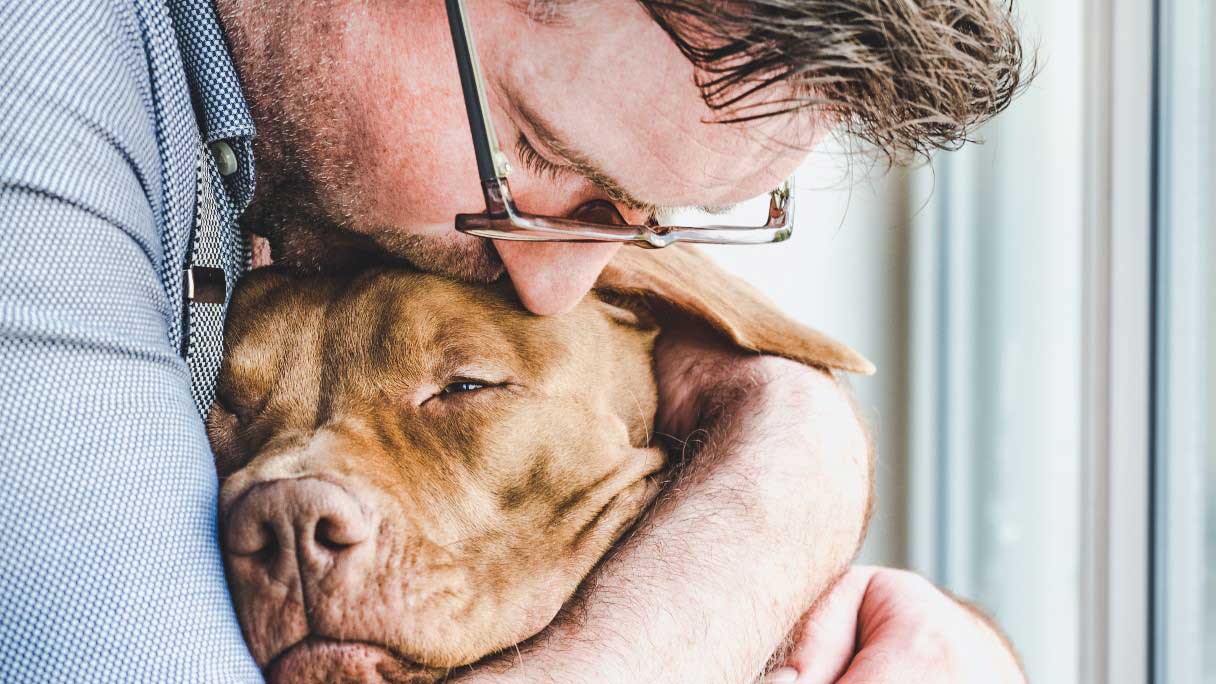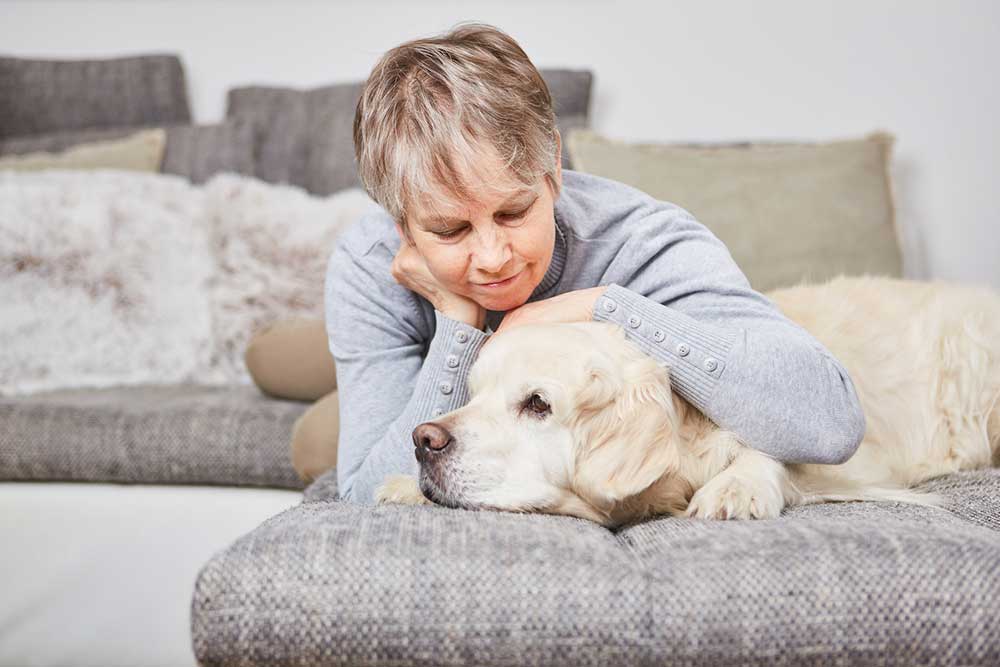Your pets are part of your family. Many people love their pets like children. So when a pet’s life comes to an end, the grief that's felt is all too real.
While everyone experiences grief differently, studies have shown that most people work through their grief in five different stages. This is also true when it comes to grieving the loss of a pet.1
Understanding these stages can help you know what to expect as you or a loved one processes grief. Here are the five stages of grief after pet loss, along with tips to help you cope with each stage.
The Five Stages of Grief After Pet Loss
Psychiatrist Elisabeth Kübler-Ross introduced the five stages of grief in her groundbreaking book, "On Death and Dying."2 It’s important to keep in mind that this is a generality and not everyone experiences grief the same way. Some people may not experience every stage, and the amount of time spent in each stage is different for everyone.
Often, these stages are not experienced in sequential order. There may be overlap between stages or circling back to previous stages as you work through your grief.3
Generally speaking, these are the five stages of grief:2
- Denial
- Anger
- Bargaining
- Depression
- Acceptance
The following details each stage as it pertains to the loss of a pet.
1. Denial
Denial might be better understood as a feeling of shock and disbelief. It’s a sense of unreality as your brain and emotions attempt to comprehend the loss. You may feel numb or bewildered, clinging to the hope that the loss isn’t real despite what your senses are telling you. Even after you’ve accepted the loss on an intellectual level, your emotions may still need time to catch up, and you may subconsciously still expect to see or hear signs of your pet’s presence for days or even weeks after they’ve passed.3
How to cope:
Understand that this is a normal reaction to a sudden — or even a not-so-sudden — passing of a beloved companion. Give yourself time to process this new reality, both cognitively and emotionally. Allow yourself to feel the emotions that come without trying to suppress them, and show yourself grace if all you feel for a time is numbness. It doesn’t mean you didn’t love your pet — actually, it's quite the opposite.4
The first few weeks after losing a pet can be especially difficult, as everyday reminders — like their food bowl, bedding or medications — can stir deep feelings of grief. Even small, familiar sights or routines may bring a strong sense of loss. For some, gradually removing or repurposing these items can ease the pain, helping to create a sense of closure.
Consider keeping a few meaningful mementos, such as a favorite toy, collar or photo to honor their memory while letting go of items that may trigger sadness. Everyone processes grief differently, so take the approach that feels right for you, allowing yourself the space and time to heal.
2. Anger
Anger is often a natural reaction to an uncontrollable loss. You may feel anger toward the situation, toward yourself for not being able to save your pet, toward your veterinarian for not doing enough or toward God or the universe for allowing this to happen. You might even be angry at your pet for getting sick or hurt. These feelings are often accompanied by guilt or anxiety.1
How to cope:
Lean into your pain and anger instead of fighting it. Your feelings are natural, and suppressing them will only make things worse. It might help to keep a journal, pray about your feelings, seek grief counseling or talk to an understanding friend or a pet loss support group to help sort out your feelings and process them in a healthy way.4
3. Bargaining
Kübler-Ross lists bargaining as the third stage of grief — an attempt to change the reality of the situation by offering something in return, such as promising to give up a bad habit if God will restore your lost loved one or alter a poor prognosis.
But, when it comes to losing pets, a stage that may take the place of bargaining is what the Cornell University College of Veterinary Medicine identifies as searching or yearning. This involves acute feelings of missing and yearning for your pet. You may find yourself crying uncontrollably or getting hit with intense waves of grief when they’re no longer there to greet you at the door or at times you don’t expect.1
How to cope:
Again, it’s important to let yourself feel these feelings and allow yourself to cry when you need to. In addition to talking to a friend or counselor about the pain of your loss, it might help to reminisce about your pet and share your memories of them. Memorializing them through scrapbooking, journaling, holding a memorial service with close friends and family or creating mementos in their honor can also help to soften your sense of loss.4
Honor your pet’s memory by creating a celebration of their life, reflecting on the joy and love they brought you. Think about all the incredible moments you shared — whether it was adventurous walks, silly antics or quiet moments of comfort. Gather friends and family to share funny and heartwarming stories, look through old photos or even create a scrapbook or tribute video. You might also light a candle, plant a tree in their memory or donate to an animal rescue in their honor.
Celebrating your beloved pet's life in a meaningful way helps keep their spirit alive while offering comfort and healing as you cherish their impact on your life.
4. Depression
As the reality of your loss sinks in, you might go through a period of depression. This can involve a deep sense of sadness and feeling like the loss is too heavy a weight to bear. You might experience physical symptoms such as fatigue, nausea, aches and pains, loss of appetite and fluctuations in your weight. You may lose interest in your normal activities and want to withdraw from the world, which in turn can lead to feelings of isolation and loneliness.3
How to cope:
If you believe you might be experiencing depression, consider reaching out to a support group or a mental health professional for assistance. Make every effort to take care of yourself by eating healthy, sleeping as much as you need to and getting outside for fresh air and exercise. Fight the urge to withdraw socially — ask friends over to keep you company and to help keep the memory of your pet alive.
Consider donating your pet’s items, such as beds, bowls, harnesses and toys, to a local rescue or shelter. These essentials can greatly benefit animals in need and provide comfort to those awaiting their forever homes. Additionally, reach out to see if they need help with transportation, fostering or other volunteer opportunities.
Offering your time and support not only makes a difference for these animals but can also be a healing and fulfilling way to channel your emotions. Staying engaged in helping other pets can bring a sense of purpose while honoring the love and bond you shared with your own pet.
5. Acceptance
Acceptance comes when you’re able to acknowledge the reality of the situation and understand that there’s no way to change it.3 Although accepting your loss doesn’t mean that the pain is gone, it’s an important step toward being able to heal and move on with your life.
How to cope:
Accepting the loss of your companion doesn’t mean you don’t miss them or that they mean any less to you. As you come to acceptance, it might help to search for meaning in your pet’s life and death and to examine your beliefs about the afterlife and where pets go after they leave us.4
If you’re ready, it might also help to get another pet. While it may feel disloyal to even think of moving on in such a way, many people find healing from loss in the love and joy that a new pet can bring.
A new pet doesn’t replace the one you lost; it marks the start of a new and unique bond. Each pet has its own personality and love to share. If you're unsure whether you're ready for this commitment, consider fostering a pet from a local rescue.
Fostering allows you to experience pet companionship without a long-term obligation, helping you gauge your emotions and readiness. It also provides a temporary home for an animal in need, making a meaningful difference while giving you time to heal and decide if you're prepared to welcome a new pet into your life.
Anticipatory Grief
The stages of grief are most acutely felt after a pet dies. But they can also be felt to varying degrees after receiving a diagnosis of a terminal illness for a pet or upon realizing your pet’s health and vitality are declining as they near the end of their life. This is referred to as anticipatory grief, which can also include feelings of fear, frustration and guilt.5
As with grief following pet loss, anticipatory grief might be helped by reaching out to a support group that can provide emotional support as you walk through the end of your pet’s life. It can also help to talk with your vet about what to expect and to come up with a plan to enhance your pet’s final days and allow them a peaceful exit.
Experiencing Grief After Pet Loss
Often, well-meaning people in your life may not understand the bond you had with your pet and may downplay your loss or place unfair or unrealistic expectations on both the depth and length of your mourning. It’s important to remember that the love you shared with your pet companion is real, and your sense of loss is valid. No one can tell you how you should grieve, or for how long.
Surrounding yourself as much as possible with people who understand and have been through a similar loss can reinforce your understanding that your grief is both normal and valid. Lap of Love can connect you with pet loss support groups and grief counselors, either online or in your area.
Frequently Asked Questions About Pet Grief
Do you still have questions about grief after a pet loss? Here are answers to some commonly asked questions on this topic.
The CareCredit Credit Card Is Here to Help
Saying goodbye to your beloved pet can be one of the hardest things we do, but the CareCredit credit card can be there for you when you need it most.* Whether it’s your first veterinary visit or your last, CareCredit is here to help you manage the costs of your pet’s care. Find a veterinarian near you that accepts CareCredit and download the CareCredit Mobile App today to manage your account, find a provider on the go and easily access the Well U blog for more helpful articles, podcasts and videos.
In addition to pet care, you can also use your CareCredit credit card for dentistry, cosmetic, vision, hearing, health systems, dermatology, pharmacy purchases, spa treatments and so much more within the CareCredit network. How will you invest in your health and wellness next?
Expert Reviewer
Dr. Kathy Wiederkehr (Wentworth), V.M.D.
Dr. Kathy Wiederkehr (Wentworth) has been practicing veterinary medicine at pet care facilities in California since 2001. Most recently, she served as medical director of the VCA PetPoint Medical Center and Resort in Irvine. She is a graduate of the University of Pennsylvania School of Veterinary Medicine and became board-certified as a diplomate in Canine and Feline Practice by the American Board of Veterinary Practitioners in 2010.
Author Bio
Jean Marie Bauhaus is a freelance writer and novelist who has been writing pet content since 2013. Her work has appeared on Forbes.com, Hill's Pet, Chewy, AKC.org and more.







